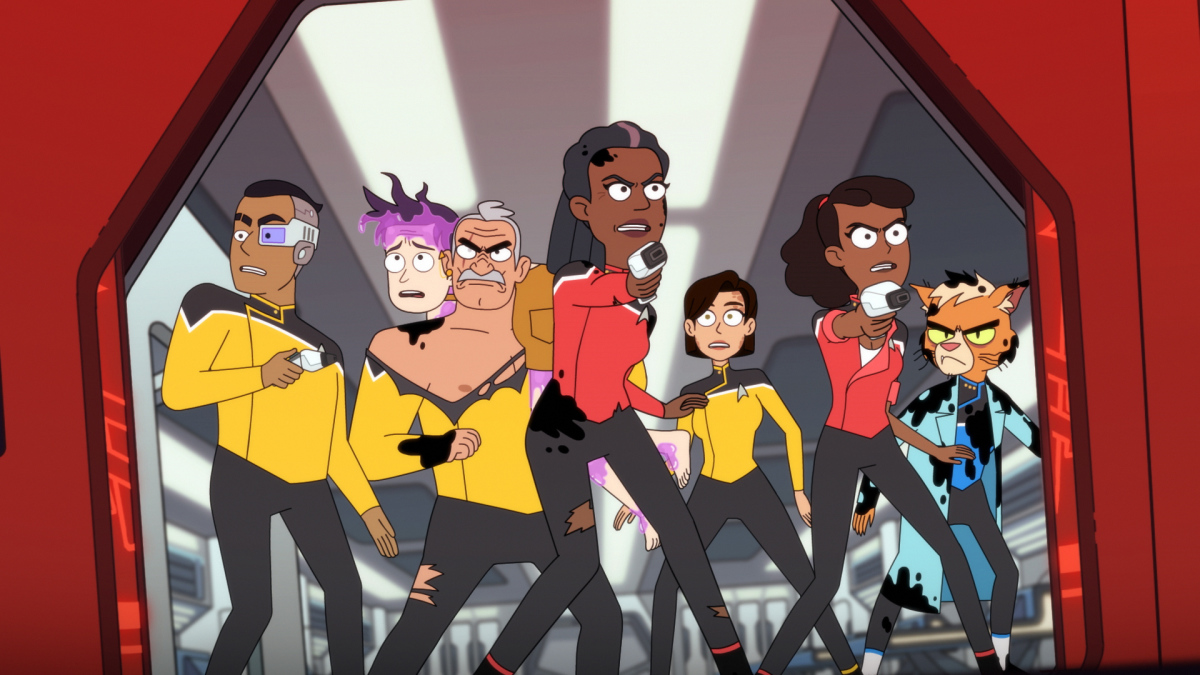CBS All Access’ commitment to the world of “Star Trek” continues with “Star Trek: Lower Decks,” the first animated series affiliated with Gene Roddenberry’s IP since the short-lived “Star Trek: The Animated Series” in the 1970s. Less narratively ambitious than either “Star Trek: Discovery” or “Star Trek: Picard,” “Lower Decks” most often exudes the energy of adoring fan fiction, relying on a viewer’s awareness of this interconnected universe for its plot details and its self-referential humor. The meta quality is intermittently witty, but the show struggles to develop an identity of its own outside of those name drops.
The latest series from Mike McMahan (who adds a third animated sci-fi comedy to his roster after showrunning “Rick and Morty,” for which he won the Primetime Emmy Award for Outstanding Animated Program, and “Solar Opposites,” which he created), “Lower Decks” follows the support crew serving on the U.S.S. Cerritos in 2380. The “lower” is both literal and figurative: The officers, scientists, and commanders in training actually bunk in a hallway in a far corner of the ship’s lowest level, and also serve as the grunt workers tasked with doing some of the worst jobs on the Cerritos. They clean conference rooms, empty trash, fix faulty food replicators, check wiring, pass out copies of presentations during meetings, and test shields and force fields. None of it is glamorous, but the Cerritos itself isn’t a particularly prestigious assignment, either—the ship has no major successes to its name, no real achievements of which Captain Carol Freeman (voiced by Dawnn Lewis) can be proud.

“We’re not really elite,” says ensign Beckett Mariner (voiced by Tawny Newsome), the ship’s resident cool girl. Instead, the unfiltered and cheeky Mariner insists, they are the “cool, scrappy underdogs of the ship,” and “Lower Decks” busies itself with sharing their contrasting perspectives about serving in Starfleet. For Mariner, who was already demoted once before, it’s all a bit of a joke. She’s excellent at everything—fluent in various alien languages, skilled with a Klingon bat’leth sword, adept at recognizing dangerous species of animal and plant life—but utterly nonplussed by the hierarchy of Starfleet.
Her entire ideology is in total opposition to fellow ensign Brad Boimler (voiced by Jack Quaid), a Starfleet mega-fan who is also a stickler for following the chain of command, abiding by the rules, and doing the job right. The two are like oil and water, with Brad complaining in every episode about how Mariner is naturally great at everything without barely seeming to try, and the animosity between the two drives each of the four episodes provided for review. (Thankfully, though, “Lower Decks” doesn’t push them, at least in this early part of the season, into the romantic direction that so many other sitcoms use for characters who rankle each other.) Less formed are the other two members of the core foursome: Sam Rutherford (voiced by Eugene Cordero), who struggles with adjusting to his new cyborg implant, and D’Vana Tendi (voiced by Noël Wells), new to the Cerritos. The former’s engineering prowess and the latter’s desperation to be liked are about the only personality traits they get, and their antics remain firmly in the B-story slot.
In a “Downton Abbey”-like move, “Lower Decks” intermittently incorporates senior-staff Starfleet members into the narrative—in particular the aforementioned Captain Freeman and the roguish First Officer Jack Ransom (voiced by Jerry O’Connell)—and aligns us with the ensigns by mostly making the people in charge myopic and egotistical. But while the friction inherent in this upstairs/downstairs dynamic is well-developed in the first four episodes, that doesn’t exactly make for gripping storytelling. In the premiere episode, “Second Contact,” an infection sweeps through the ship that turns nearly everyone into rage-fueled creatures that crave flesh; the animated black vomit is gross, but nothing new in terms of zombie imagining. Brad and Mariner get stranded in a planet’s unsecured Klingon district in “Envoys” and have to work together to hitch a ride back onto the Cerritos; the funniest moment in the episode, though, is when Rutherford freezes during a simulated attack on the ship. His indecision during the fictional assault causes all the ship’s children to be ejected into space—both kindergarten and pre-kindergarten, a crew member reports, noting that no one has ever failed the simulation so badly before. “Temporal Edict” and “Moist Vessel” split up Mariner and Brad to pair them with the captain and Ransom, and although that makes for an appreciable change of pace, neither episode finds a meaningful plot for Rutherford or Tendi. The episodic imbalances are difficult to ignore.
“Lower Decks” doesn’t quite find its footing in organizing these characters or progressing these plots, burning through what could have been two or three episodes of story in “Moist Vessel” in particular. The result is a series that defaults to references to other TV shows and films (“Upgrade” and “Mission: Impossible – Fallout,” most obviously) and to “Trek” itself (characters mentioned in one scene alone: Spock, Khan, Sulu, Worf, and Deanna Troi) rather than building its own overarching concept. Some sight gags work, like a map showing how far down the “lower decks” really are and Mariner’s recurring yawning during important meetings, and the animation from Titmouse fits in neatly with the established visuals of the “Star Trek” universe. Less effective is the “adult” content, which includes one glimpse of an “all-nude Olympic training facility” that Mariner fantasizes about and a few bleeped-out curse words. “Lower Decks” doesn’t commit to these “mature” details enough to make them worthwhile, and that analysis could be applied to the show overall. So far unwilling to dive into either hard satire or zany irreverence, “Lower Decks” is amusing but slight, and needs a clearer course forward to demonstrate whether the angle it brings to “Star Trek” has singularity or longevity.
Four episodes screened for review.












